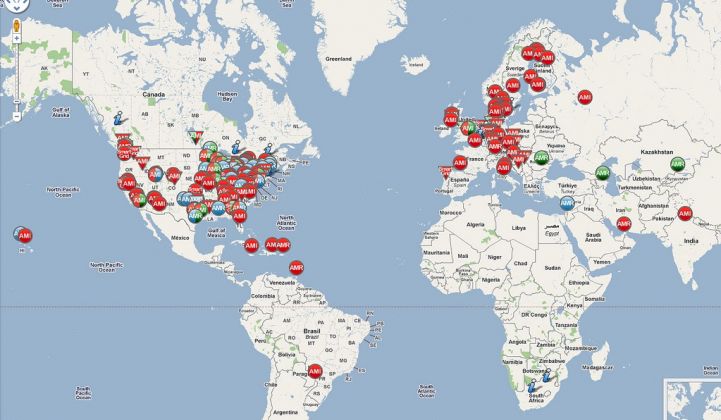U.S. smart meter maker Itron had few surprises in its third quarter 2012 earnings call last Thursday. CEO LeRoy Nosbaum affirmed earlier GTM Research predictions of flat to slightly negative sales through the end of 2012 and heading into the first half of 2013. Don’t single Itron out, though -- this trend isn’t unique to the Liberty Lake, Wash.-based company, but rather reflects the state of the industry as a whole.
What’s driving the slowdown? In North America, only a handful of potential multi-million endpoint contracts remain, and regulators have become increasingly stringent in approving business cases for advanced metering infrastructure (AMI). In Europe, macroeconomic and political uncertainties as well as immature standards have delayed tenders at several utilities such as France’s ERDF. Concurrently, large projects won several years ago are now coming to a close.
The impact of project ramp-down has been significant. Itron’s global electric business revenue decreased 24 percent in constant currency from Q3 2011, largely due to the fact that several key OpenWay projects in North America have been completed or are nearing completion. Those include deployments at CenterPoint Energy, Southern California Edison, San Diego Gas & Electric and BCHydro.
Other marquee projects including Detroit Edison have also progressed rapidly, Nosbaum said. As a result, the company’s OpenWay backlog from the five aforementioned projects has decreased to $285 million -- down from the post-stimulus high of $949 million in Q3 2010.
The acquisition of cellular smart meter company SmartSynch (now Itron Cellular Solutions) added $60 million to backlog in Q2 and will be a critical component in acquiring new business going forward, given that Itron’s largest competitor, Silver Spring Networks, also offers RF mesh and cellular networking capabilities. Itron’s management also noted the scope of the project at Michigan utility Consumer’s Energy has expanded, and there may be an opportunity to improve margins by utilizing Itron meter hardware in tandem with Itron Cellular Solutions communication modules.
In other smart grid earnings notes, smart meter and building controls networking technology vendor Echelon’s revenues in the Americas were down 67 percent from Q3 2011, largely due to the company’s marquee project with Duke Energy Ohio nearing completion. While Duke is still awaiting regulatory approval in its Indiana service territory, it appears Itron will be providing additional OpenWay meters in Ohio, as well an unspecified number of meters in the Carolinas, through a $43 million contract announced in the previous quarter.
While the North American investor-owned market has slowed substantially, there has been increased activity among both municipal and cooperative utilities, which collectively account for about 30% of the U.S. market. Despite the flurry of activity, including Itron’s recent win at the Los Angeles Department of Water and Power, the sales volumes won through new municipal and cooperative contracts will be unable to fill the void in sales from the declining IOU market.
Given the slowdown in North America, and tempered growth expectations in Brazil following the Brazilian regulator’s August opt-in decision, vendors’ focus will to shift to Europe and Asia, where several RFPs should breathe life back into the industry in late 2013, most notably through offerings at ERDF in France, Iberdrola in Spain, and Tepco in Japan. However, it is important to note that contracts outside North America are typically awarded to more than one vendor. Such was the case at Spanish utility Iberdrola, which awarded a one-million-meter contract to seven different vendors in the first quarter of 2012. Despite being selected to provide Iberdrola with its meter data management system, Itron did not have a competitive offering in the first bidding process. However, the company expects to have a qualified product ready in time for Iberdrola’s next RFP.
China should not be overlooked either and Echelon has positioned itself nicely to acquire new business through a joint venture with Holley Metering. However, meters and associated communications chips are becoming increasingly commoditized in China and there could be significant downward price pressure from domestic vendors.



